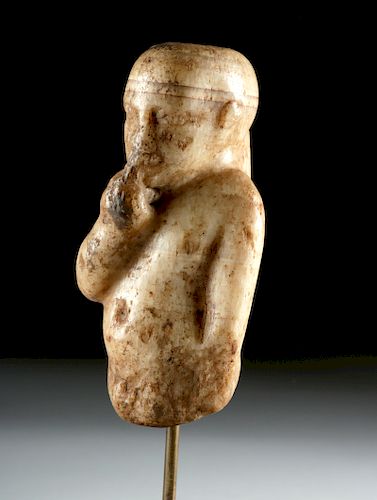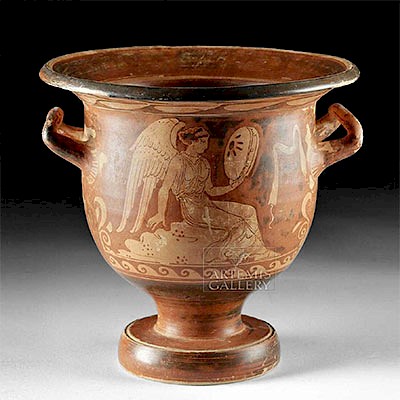Romano-Egyptian Alabaster Statue - Harpokrates
Lot 15
About Seller
Artemis Fine Arts
686 S Taylor Ave, Ste 106
Louisville, CO 80027
United States
Selling antiquities, ancient and ethnographic art online since 1993, Artemis Gallery specializes in Classical Antiquities (Egyptian, Greek, Roman, Near Eastern), Asian, Pre-Columbian, African / Tribal / Oceanographic art. Our extensive inventory includes pottery, stone, metal, wood, glass and textil...Read more
Estimate:
$2,000 - $3,000
Absentee vs Live bid
Two ways to bid:
- Leave a max absentee bid and the platform will bid on your behalf up to your maximum bid during the live auction.
- Bid live during the auction and your bids will be submitted real-time to the auctioneer.
Bid Increments
| Price | Bid Increment |
|---|---|
| $0 | $25 |
| $300 | $50 |
| $1,000 | $100 |
| $2,000 | $250 |
| $5,000 | $500 |
| $10,000 | $1,000 |
| $20,000 | $2,500 |
| $50,000 | $5,000 |
| $100,000 | $10,000 |
| $200,000 | $20,000 |
About Auction
By Artemis Fine Arts
Mar 7, 2019
Set Reminder
2019-03-07 10:00:00
2019-03-07 10:00:00
America/New_York
Bidsquare
Bidsquare : VARIETY SALE | Antiquities & Ethnographic Art
https://www.bidsquare.com/auctions/artemis-gallery/variety-sale-antiquities-ethnographic-art-3928
Around the world & back in time - be amazed at the treasures you will find. Antiquities from Egypt, Greece, Italy and the Near East, Asian, Pre-Columbian, African / Tribal / Oceanic, Native American, Spanish Colonial, Russian Icons, Fine Art, much more! Artemis Fine Arts info@artemisgallery.com
Around the world & back in time - be amazed at the treasures you will find. Antiquities from Egypt, Greece, Italy and the Near East, Asian, Pre-Columbian, African / Tribal / Oceanic, Native American, Spanish Colonial, Russian Icons, Fine Art, much more! Artemis Fine Arts info@artemisgallery.com
- Lot Description
Egypt, Romano-Egyptian Period, ca. 1st century BCE to 1st century CE. A gorgeous fragmentary statue depicting the child god Harpokrates (from the Egyptian "Her-pa-khered," literally "Horus the child"). Carved from yellow-brown alabaster with natural bands of beige and chocolate hues, the boy stands nude with delineated genitalia beneath a pudgy belly, his left arm held tightly against his side, and his right bent and pointing a finger to his smiling mouth. Almond-shaped eyes, a broad nose, perky ears, and rounded cheeks constitute his pre-pubescent countenance, and a drooping sidelock of youth cascades down the side of his bald pate. An integral back pillar tapers to a point above the neck, and a drilled cavity atop his head perhaps at one time held slender candles or small offerings. Size: 1.5" W x 3.4" H (3.8 cm x 8.6 cm); 5.7" H (14.5 cm) on included custom stand.
Harpokrates (also Harpocrates) was, in many ways, one of the most popular deities in the Egyptian pantheon for centuries on end. The offspring of Osiris and Isis, Harpokrates was originally thought to be a protective deity, warding dangerous magic and creatures away from the wielder of his effigy. His depiction as a child was a common sight in ancient Egypt as infantile gods were favored to their adult characterizations from roughly the Third Intermediate Period on into Greco-Roman times. Created mostly as temple votives, child gods were thought to have a higher concentration of power and influence, thus making for a stronger prayer request when left as an offering.
References to Harpokrates appeared in classical literature, including Pseudo-Hyginus, Fabulae 277 (Roman mythographer c. 2nd century CE) and of course Ovid's Metamorphoses as we see in the following passage, "She saw before her bed, or seemed to see as in a dream, great (Egyptian goddess) Isis with her train of holy deities. Upon her brow there stood the crescent moon-horns, garlanded with glittering heads of golden grain, and grace of royal dignity: and at her side . . . (Harpocrates) the god who holds his finger to his lips for silence's sake." (Ovid, Metamorphoses 9.688 ff - trans. Melville - Roman epic ca. 1st century BCE to 1st century CE).
Provenance: private East Coast, USA collection; ex-collection of a Mayor of Boston, Massachusetts, USA; ex-private Boston, Massachusetts, USA collection, acquired in the 1960s and 1970s
All items legal to buy/sell under U.S. Statute covering cultural patrimony Code 2600, CHAPTER 14, and are guaranteed to be as described or your money back.
A Certificate of Authenticity will accompany all winning bids.
We ship worldwide and handle all shipping in-house for your convenience.
#142899This is a fragment of a larger alabaster figure. Original lower body and legs missing. Small losses to parts of thighs, one bicep, and one hand, minor nicks and abrasions to head, arms, and body, with softening to finer details around face, light encrustations, and darkening to natural stone color. Nice earthen deposits throughout. Drilled through base for display.Condition
- Shipping Info
-
All shipping is handled in-house for your convenience. Your invoice from Artemis Gallery will include shipping calculation instructions. If in doubt, please inquire BEFORE bidding for estimated shipping costs for individual items.
-
- Buyer's Premium



 EUR
EUR CAD
CAD AUD
AUD GBP
GBP MXN
MXN HKD
HKD CNY
CNY MYR
MYR SEK
SEK SGD
SGD CHF
CHF THB
THB














